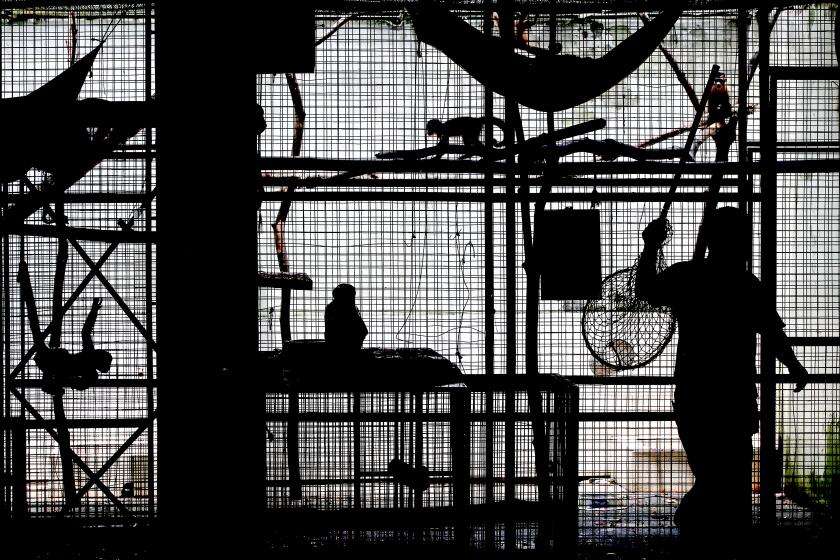From soured friendships to Bannon advising the president, Brazil looks a lot like the Trump-era U.S.
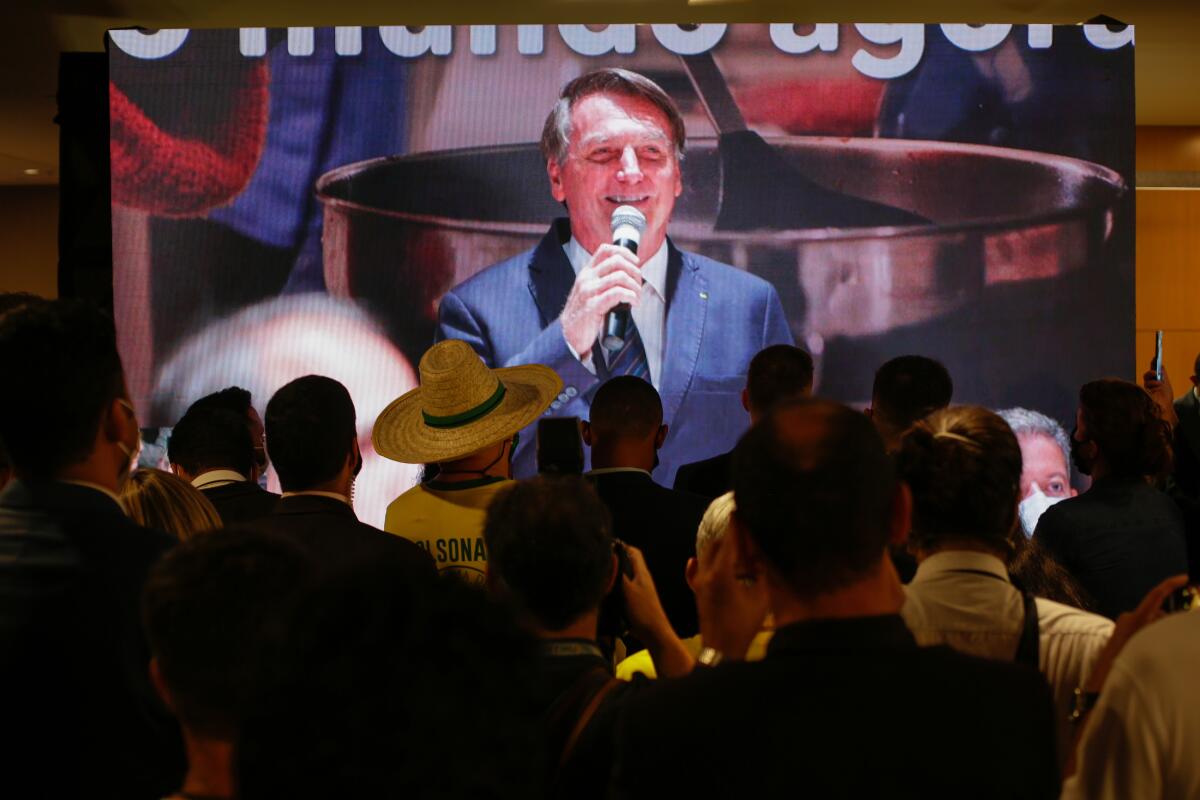
- Share via
SÃO PAULO, Brazil — Inara Couto, a 54-year-old teacher here, won’t shop at stores whose owners support Brazilian President Jair Bolsonaro.
She stopped speaking to some of her oldest friends for the same reason.
Her husband, Sergio, is so at odds politically with his Bolsonaro-backing, COVID-vaccine-refusing brother that the two mostly limit their conversations to a single topic: soccer.
Deforestation is erasing the line between humans and wild animals — and increasing the chances of the next global pandemic.
Ten months before the next presidential election, Brazil is more polarized than at any point in recent memory, with political conflicts and raging culture wars souring friendships, wrecking family gatherings and spilling into the streets.
At the center is Bolsonaro, 66, a far-right nationalist who rode into office three years ago on a wave of populist anger over corruption and who now insists there are only three possibilities for his future: jail, death or reelection.
Like former President Trump, whom Bolsonaro has described as his “idol,” the Brazilian leader has downplayed the coronavirus, stoked racial resentments, relaxed environmental protections and rallied his supporters to the nation’s capital to protest his perceived enemies in Congress and the courts.
With the help of Trump strategist Stephen K. Bannon, he has already begun sowing doubt about electoral fraud in the event that he loses.
And as in the United States a year ago, the opposition’s best hope of defeating the demagogic incumbent rests with an old stalwart of the left who is trying to kindle nostalgia for more civil and prosperous times.
Polls show Bolsonaro badly trailing former President Luiz Inacio Lula da Silva, the charismatic 76-year-old democratic socialist who was jailed in 2018 for corruption but released the following year after his convictions were annulled.
Lula, as he is known, is a divisive figure in his own right, beloved by many for lifting millions out of poverty but despised by others as a symbol of Brazil’s entrenched corruption.
Even if Lula wins, there are questions about whether Bolsonaro and his supporters will accept defeat and whether his tenure has done irreparable harm to the country’s fragile democracy.
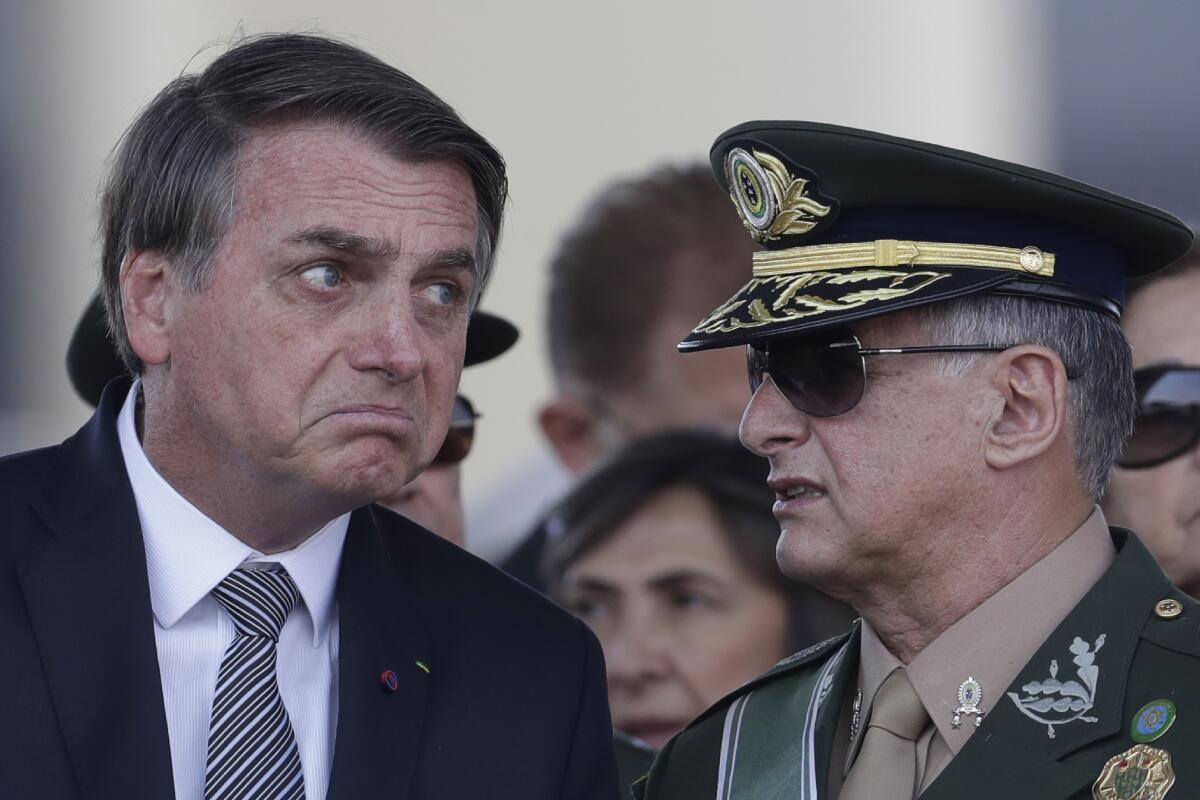
Bolsonaro, a former military officer, has lionized the country’s former military dictatorship, vowed to defy Supreme Court rulings and called on his supporters to arm themselves.
The rally he organized in Brasilia in September did not turn violent, as many had feared. But the deterioration of political discourse is evident nearly everywhere — from heated WhatsApp groups to impassioned dinner table debates.
This month, Bolsonaro supporters and members of his security detail attacked journalists who were trying to interview him. In the city of Borba, two rival politicians settled their differences with kicks and punches in an MMA-style fight.
Couto recently marched in an anti-Bolsonaro protest, holding a sign that read: “This nightmare must come to an end.”
A survivor of Brazil’s repressive dictatorship, which ruled from 1964 to 1985, she said life has never felt more turbulent than it does today. The country’s economy is in recession, more than 600,000 people have died of COVID-19, and she finds herself constantly bracing for conflict, whether with a stranger or a beloved member of her family.
“It’s like a big collective madness,” she said. “We feel like we are in some kind of dystopian novel — one that is very poorly written.”
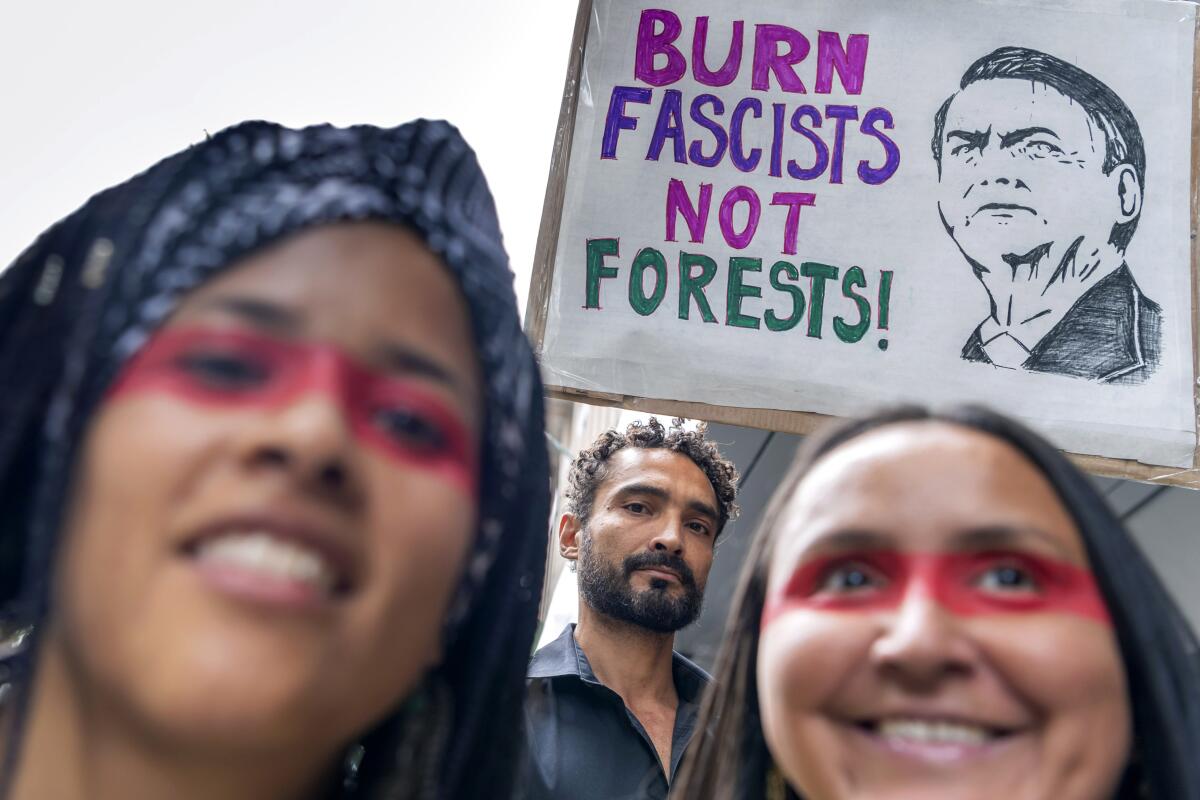
It wasn’t long ago that Brazilians were filled with hope.
In the 2000s, global demand for beef, soybeans and iron, along with Lula’s broad social programs — including cash payments to the poor — lifted an estimated 20 million people out of poverty.
When Lula left office in 2010 after serving the maximum two consecutive presidential terms, he had an 83% approval rating and had been dubbed the “most popular politician on Earth” by President Obama.
But shortly after Lula’s protege, Dilma Rousseff, took office, commodity prices began to fall and the economy crumbled. Sprawling corruption investigations implicated politicians from across the ideological spectrum, including Rousseff and Lula.
Conservatives seized on the disappointment, impeaching Rousseff in 2016 on charges of manipulating the federal budget. During the trial, a fringe congressman drew national attention when he dedicated his impeachment vote to a Brazilian army officer who had captured and tortured Rousseff when she was a young guerrilla fighting the dictatorship.
That congressman was Bolsonaro, who won election two years later by modeling himself after Trump as a politically incorrect outsider who would “make Brazil great” by cleansing politics of corruption and cracking down on crime with an iron fist.
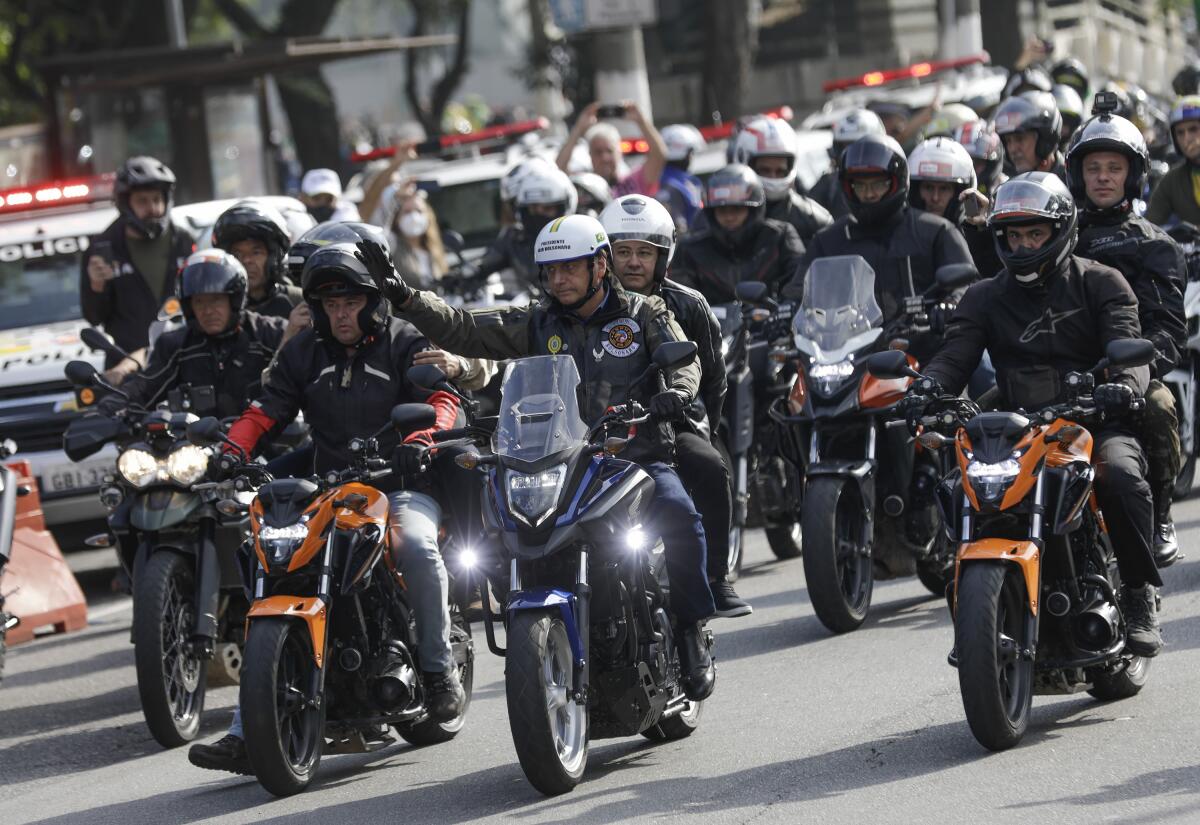
He called immigrants “scum,” said a female political rival was so ugly she was “not worth raping” and proclaimed that he would prefer his son die than be homosexual.
But many voters were so eager for a change that they were willing to overlook such inflammatory statements.
“He goes too far sometimes, but he talks straight to the people,” said Eurico Da Conceicao Santos, a 49-year-old lawyer who had once supported both Lula and Rousseff but came to regret it when they were accused of corruption.
He said it was his duty as an evangelical Christian to support Bolsonaro. That conviction has helped him overlook recent accusations of corruption against two of the president’s sons.
Santos spoke over the din of Christian rock playing at a church party for teenagers where he was volunteering on a recent afternoon.
The pastor at the church, Change Life Ministry, has described Bolsonaro, who furiously opposes abortion and LGBTQ rights, as “an instrument of God.”
A majority of Brazil’s growing population of evangelical Christians continues to support Bolsonaro, even as it has led to some intense family debates.
Some of Santos’ relatives question how he can be a Christian but also support Bolsonaro policies they consider un-Christian, including calls to arm more Brazilians with guns.
His wife, Sandra Hinz Da Souza Santos, a 52-year-old accountant, shares her husband’s political views but worries where it will lead the country.
“We’re tearing Brazil apart,” she said.
Other segments of society, including women and people with college degrees, have lost patience with the president.

The turning point for most was the coronavirus, which Bolsonaro famously dismissed as a “little flu” even as it ravaged Brazil.
In the face of the pandemic, he encouraged mass gatherings, mocked masks in a bid to achieve herd immunity and recommended unproven treatments.
His policies — including his government’s delay in procuring vaccines — led to 300,000 deaths, more than half the total in Brazil, according to a congressional panel that recently recommended he be charged criminally with crimes against humanity.
Other investigations of Bolsonaro — including a Supreme Court probe into his false claim that COVID-19 vaccinations put people at a higher risk of contracting AIDS — have also damaged his popularity.
So has the country’s deepening economic crisis. With 13% of the workforce unemployed and soaring inflation, millions of people are going hungry. Public parks have been swallowed up by tent cities, with en- tire families living on the streets.
As he trudged through downtown Sao Paulo on a recent afternoon, handing out his resume to anybody who would accept it, Jose Bonfim, 56, said the hard times had made him long for the days of Lula, his candidate for next year’s election.
Bonfim was laid off a year ago when the restaurant where he had flipped burgers for 13 years closed because of the coronavirus.
Under Lula, he had been able to buy a car. It’s sitting at home now, unused. “I have no money for gas,” he said.
There are other candidates who have sought to appeal to voters in the center, but some of them also have sullied reputations.
Sergio Moro, the judge who oversaw Lula’s corruption case and who was later named Bolsonaro’s justice minister, was disgraced this year when leaked messages showed he had offered strategic advice to prosecutors in the Lula trial.
Another likely candidate, Ciro Gomes, had his home raided by federal police this month as part of a corruption investigation.
And so the race continues to be dominated by two candidates — from the left and right — who are appealing to nostalgia for very different versions of the past.
Nilton Goncalves de Oliveira, the owner of a firearms store called Top Gun, voted for Bolsonaro in 2018 because he vowed to ease gun restrictions. The president made good on his promise, in 2019 signing an order increasing the amount of ammunition a person can buy in a year and making it easier to import guns.
De Oliveira said he also understood Bolsonaro’s appreciation for the dictatorship.
Back then, he said, there weren’t furious debates about politics and racism like the ones that have consumed his soccer team, making postgame celebrations unpleasant. The streets were safe and work was ample, he said.
“Everybody had a job,” he said. “It was not so bad.”
He’s looking forward to voting for Bolsonaro again.
Special correspondent Marcelo Soares in São Paulo contributed to this report.
More to Read
Sign up for Essential California
The most important California stories and recommendations in your inbox every morning.
You may occasionally receive promotional content from the Los Angeles Times.
